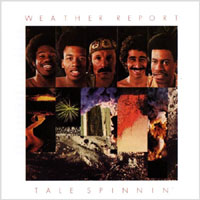Weather Report • Tale Spinnin' Columbia/Speakers Corner PC 33417
Tale Spinnin’ has an outdoor, festive feel. Its music arises from street celebrations, animated conversations and wild, frantic dancing. Not surprisingly, a distinct undercurrent of funk permeates the proceedings, with the exciting drumming of Herbie Hancock’s former drummer, Leon "Ndugu" Chancler, and the bass of Alphonso Johnson. Multi Grammy winner Wayne Shorter demonstrates throughout this album, on both tenor and soprano saxophones, why he was (and still is -- he just released a new album, Without a Net, to coincide with his 80th birthday) one of the leading sax men in jazz history. The late Joe Zawinul shows he is a master of just about anything with a keyboard attached to it. He was always a fan of technology and made strides in the studio utilizing the technological improvements in synthesizers, such as ARP and Oberheim, even making use of the gigantic studio-based TONTO array on several tracks of this album. Designed and constructed by Malcolm Cecil, TONTO was reputedly the world's first and largest multitimbral polyphonic analog synthesizer. The sound effects produced using such tools were often musically questionable, exposing the limits of the then-new technology. Zawinul helped change this situation and turned random, electronic blurps and bleeps into what became increasingly lovely and intriguing sounds. The impact of this fascination with the new is scattered throughout this over-complicated album, which reflects the continuing interest Zawinul and Shorter had in world and ethnic music. From the raucous, street-life symphony of "Man in the Green Shirt" to the atmospheric, Far East-influenced "Badia," the music meanders between lyrical, singing themes and out-and-out funk, all performed by an extremely talented group of musicians. Speakers Corner Records, headquartered in Germany and with over 300 titles in its catalogue, stakes its reputation on the fact that, unless absolutely necessary, they have never used any digital source to produce LPs. In the case of Tale Spinnin’, this meant a 1:1 tape copy from the original analog master tape, which was recorded at Wally Heider’s famous studio in San Francisco and admirably engineered by Bruce Botnick. All LPs from Speakers Corner are pressed at Pallas in Germany, and the review copy here was perfectly flat, quiet and weighty. The jacket and artwork are first-class, nicely duplicating the original. Because I had an original pressing from 1975 on hand, I was able to do a comparison between it and this reissue. The original has the sparkle of a freshly minted coin. The highs seem to go higher, the lows, especially the synthesized bass 2:28 into "Lusitano," lower. The edges of the soundstage are better delineated, as is the separation among the palette of instruments. This reissue sounds very fine, though, and I am perfectly happy with it, even having a clean original available. Not having to contend with lame, mid-'70s pressings is a blessing. Tale Spinnin’ is not
essential, but it is lots of fun, with ear candy galore. |

